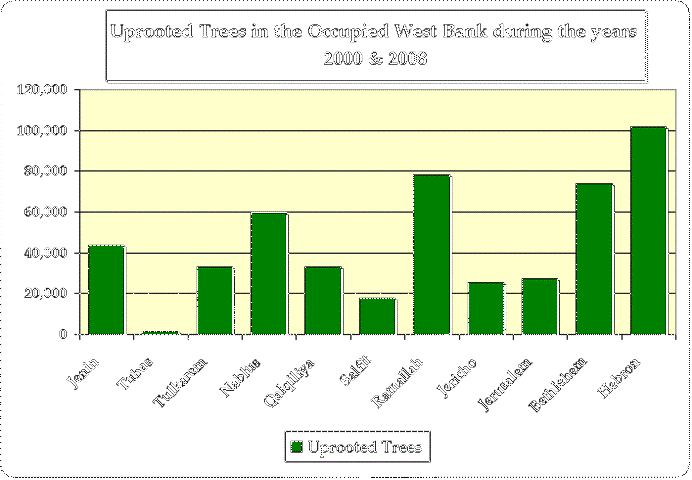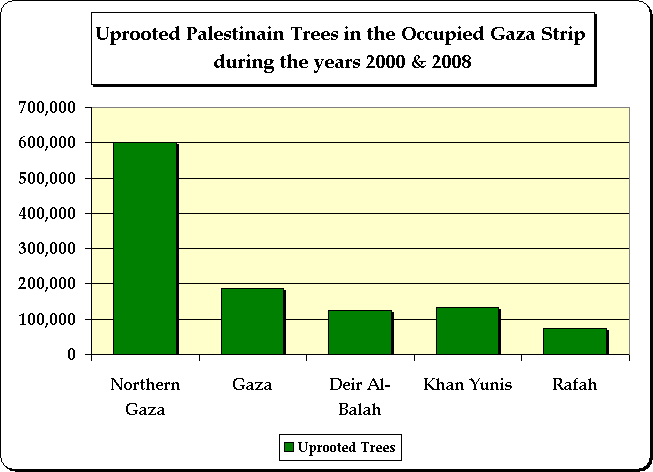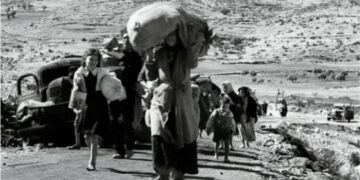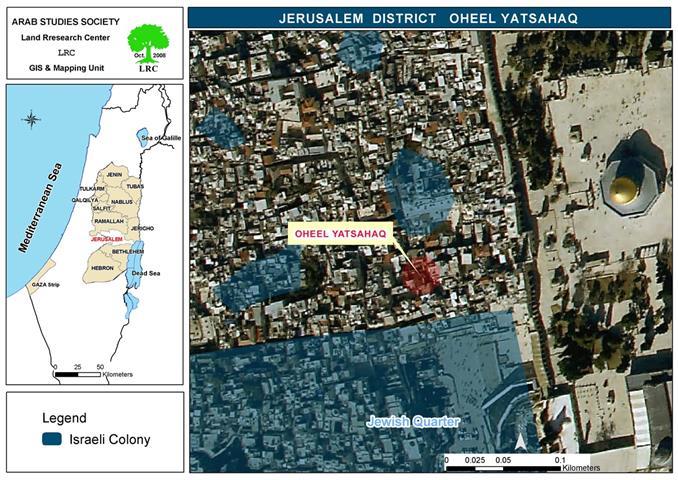Olive trees, symbolizing prosperity and peace, is part of the Palestinian heritage, part of the identity of the Palestinian people, and an essential elements in there cultural life and physical existence. More directly, for many Palestinians the olive tree is irreplaceable as the primary source of income for more than 100,000 Palestinian families in the West Bank and Gaza Strip.
During the last 41 years, the consecutive governments of Israel have made sure to break the ties that join the Palestinians have with their land; so they granted the executive arm of the Israeli state; the Israeli Army all the latitude to adopts and utilize every possible measure and law to fulfill this objective, and to this end, the Israeli Army made sure to ravish the Palestinian land, to confiscate the land and uproot the trees under alleged security needs.
The Israeli Army systematic attack on Palestinian trees has started with the Israeli occupation of the Palestinian territory back in 1967 and resulted in the uprooting of more than 1000,000 until 1999. From beginning of the current Intifada in the year 2000, particularly from the time when the Israeli Army started with the Segregation Wall, more than 1.4 million trees. Palestinian cultivated lands with fruitful trees have always been a favorite choice of the Israeli Army to build the Segregation Wall on or for any other related act. The reason why trees are systematically targeted by the Israeli Army is because for what the represent to Palestinians; a bond to their lands, their livelihood and a bona fide proof of their indisputable rights to the land. The Israeli Army uprooting Palestinian trees does not only coerce its will on the ground to build the Segregation Wall or build/ or expand settlements; but it destroy the reason for Palestinians to keep on hanging to their lands.
The Israeli anti-environment policy against the Palestinian agriculture falls no further than encoded “Ecocide” policy of “State Vandalism”, which is an organized, predetermined eradication of trees, as more than 1.6 million trees were uprooted from the occupied territory since the beginning of the Second Intifada in the year 2000 until August 2008, which practically violates every article and clause of the International Humanitarian Law, and the Fourth Geneva Convention of 1949. The following table shows the numbers of trees uprooted in the various West Bank and Gaza districts by the Israeli Army and settlers in the period between September 2000 and August 2008.
|
Number of trees uprooted from Palestinians’ lands by the Israeli Army and settlers throughout the West Bank’s & the Gaza Strip’s Districts in the period between September 2000 – August 2008 |
||||
|
WB Districts |
Uprooted Trees |
Gaza Districts |
Uprooted Trees |
|
|
Jenin |
43,736 |
Northern Gaza |
602,208 |
|
|
Tubas |
1,228 |
Gaza |
186,737 |
|
|
Tulkarem |
33,353 |
Deir Al-Balah |
124,723 |
|
|
Nablus |
59,314 |
Khan Yunis |
132,656 |
|
|
Qalqiliya |
32,992 |
Rafah |
74,446 |
|
|
Salfit |
17,926 |
|
||
|
Ramallah |
78,225 |
|||
|
Jericho |
25,537 |
|||
|
Jerusalem |
27,573 |
|||
|
Bethlehem |
74,120 |
|||
|
Hebron |
101,873 |
|||
|
|
||||
|
Total |
495,877 |
Total |
1,120,770 |
|
|
|
||||
|
WB & Gaza Grand Total |
1,616,647 |
|||
|
Trees include Olive, Citrus, Stone Fruit, Forestry, Date Palm, Banana, Grape, others. |
||||

Figure 1: Uprooted Trees in the Occupied West Bank during the period 2000 & 2008
Figure 2: Uprooted Trees in the Occupied Gaza Strip during the period 2000 & 2008
The plan intact of the segregation wall is set to isolate up to 733km² of the West Bank land, and it has a direct consequence on the agricultural wealth of the Palestinians.
Total area planted with olive trees in the West Bank is in the region of 900,000 Dunums holding more or less 18 million olive trees Total area of land planted with olive trees isolated west of the segregation wall is 90,858 Dunums, which is 10+ % of the total area cultivated with olive trees, holding approximately 18,17160 olive trees.
Even though the Israeli administration allegedly went on making arrangements to facilitate the olive harvesting process and securing and observing the settlers actions as to avoid attacks by settlers that have been going on in the last several years toward the Palestinian farmers much few of those arrangements took place or had direct or sufficient effects on real ground.
Violations by Israeli occupying force didn’t stop on the ground by building the segregation wall but was even amplified by the road blocks and earth mounds that are mushroomed all over the West Bank laying more obstacles for framers looking to harvest there crops of olives. Settlers has even set more attacks on olive fields, 'unethical' such as attacking the natural reserve of olive trees, destroying, uprooting and overgrazing of the olive trees, usually under the protection of the Israeli Army, neglecting all calls for the end of such abuse by national and international community and from civil right and environmental organizations and movements.
Settlers and Israeli occupying force violations against the Palestinian harvest season:
During the last couple of weeks, the Israeli settlers escalated their assaults and attacks against Palestinian farmers during the harvest of olives groves in the West Bank. Following is a list of Israeli settlers' attacks against Palestinians in the West Bank during the month October 2008. (Source: ARIJ monthly reports):
-
On October 3, 2008: a group of Israeli settlers clashed with Palestinian farmers and international peace activist in Ni'lin to the north of Ramallah.
-
Similar attacks by settlers took place in Hebron as Israeli settlers attacked activists from 'Rabbis for Human Rights' who where escorting the Palestinian farmers to harvest.
-
On October 4, 2008: Israeli settlers attacked the home of Mohammad Abu Tarqib (50 years old) in Hebron, steeling the olive crop in the midst of the harvest.
-
On October 5, 2008: to the west of Nablus city, the village of Tell; 20 Palestinian farmers attempted to harvest there lands which are adjacent to the illegal settlement of 'Gilad', but after 2 hours forced to leave by the Israeli occupying force.
-
In the same day in Qalqilya district, in the village of 'Inmatin' a settler from the illegal settlement of 'Kedumim' burned trees and damages over ten Dunums of land.
-
Settlers from 'Yizhar' attacked the village of 'Asira Al-Qibaliya' with stones and clubs causing damage to the farmlands.
-
On October 11, 2008: settlers from 'Yizhar' illegal settlement attacked Palestinian farmers from Nablus while they were harvesting the olive trees, injuring 2 of the Palestinian farmers and causing various damages and cutting more than 15 olive trees.
-
On the 10 October 2008: settlers from the illegal settlement of 'Gilad' have uprooted and cut down a total of 20 olive trees in the west bank village of 'Gith'.
-
Attacks by settlers from the illegal settlement 'Shvut Rachel' also were carried out preventing farmers of 'Far'ata' from approaching their olive groves.
-
Settlers from 'Har Barcha' rained Palestinian farmers with stones causing some miner injuries among the farmers who were harvesting their olive crops.
-
On October 12, 2008: Israeli settlers from Susiya located in the southern part of Hebron district attacked a Palestinian woman and 2 of her sons while they were peacefully harvesting the olive crops, the three where hospitalized in a near by hospital in 'Yatta' village, the settlers ran away as the Israeli occupying Army arrived to the area. An Israeli Army commander who arrived on site commented on the incident saying' that the Israeli settlers don’t need a permission or a reason to attack the Palestinians in Yehuda and Shemron area but the olive harvest season highlights a high figure of attacks by settlers '.
-
On October 15, 2008: the Israeli civil administration granted several farmers from 'Azon Atmeh' in Qalqilya permits to access to the agricultural gates and harvest the olive groves, noting that the Israeli civil administration has declared that it will grant access to all farmers to there seized lands beyond the Segregation Wall, the mayor of 'Atmeh-Azon' said: 'few were granted entry, one person from each family was only granted that permission which makes the olive harvest kind of an impossible mission'.
-
On October 16, 2008: Israeli settlers from 'Itamar' near the city of Nablus released cattle to graze the olive groves in the lands of the Palestinian village of Beit Furiek to prevent the Palestinians from accessing their agricultural lands for the olive harvest season.
-
In Jenin, Palestinian farmers urged several human rights movements and organizations, in an attempt to pressure the Israeli civil administration to issue them entry permits to their isolated lands behind the Segregation Wall.
-
In 'Kufur Al-Labad' in the district of Tulkarm, In the late hours of the nights the Israeli Army along with bulldozers building up road-blocks and earth-mounds, making it harder for farmers to reach there olive groves to harvest them.
-
Settlers from 'Elon Moreh' illegal settlement attacked the Palestinian farmer's vehicles causing lose in there personal property, as said by Hamed Allah Affaneh 'the settlers attacked the cars and destroyed them which were parked in a distance of 100M from the Israeli checkpoint, and the Israeli forces didn’t move at all as to stop them even that he had pledged them to interrupt the settlers'.
-
To the east of Qalqilya district in the village of 'Kufur Kadum' settlers from the 'Kedumim' illegal settlement set fires in olive fields damaging and destroying more than 100 olive trees.
-
On October 18, 2008: in Hebron district, Israeli settlers from 'Tell-Rameda' attacked several peace activists who were escorting the Palestinian farmers to there olive groves for harvest. The Israeli settlers attacked the Palestinian farmers with stones, and upon the arrival of the Israeli Army, the settlers left the area and the farmers and activists were threatened with being arrested if they don’t leave, a peace active and a journalist where injured in that incident.
-
In Jenin district, the Israeli civil administration denied 336 Palestinian farmers access to some 7000 Dunums of lands isolated behind the Segregation Wall by denying them permits to access the agricultural gates.
-
On October 20, 2008: Palestinian farmers from the village of Azzmot in Nablus were subject to repeated attacks by the Israeli settlers from Elon Moreh settlement.
-
Israeli settlers from the illegal settlement of “Mevo Dotan” attacked Palestinian farmers from the Villages of “Ya’abed” and “Arraba” in Jenin district.
-
Calls were sent out to human rights NGO's by the people of Salfit district, to report the distraction of there olive groves on the hands of the Israeli settlers of 'Ariel' and 'Tafouh” settlements. The targeted olive groves are located behind the Segregation Wall and the settlers were denying Palestinian farmers even those with permits to access the agricultural gates.
-
In Qalqilya district, at the groves of the Palestinian village of “Kufur Kadum”, more than 100 Israeli settlers attacked the farmers and international volunteers who where escorting the farmers to harvest the olive crops,
The recent violations against the Palestinian farmers show clearly the inability of the Israeli Army to control the settlers’ violations in the West Bank territory. These violations cited above are mere examples of endless violations committed by the Israeli settlers against the Palestinians and easily neglected by the Israeli Army that is unwilling to take any action unless the Palestinians stand up to the settlers and attack them back. This happens in spite of the fact that the Israeli Army and the civil administration have an obligation and to be more specific a legal; obligation set forth by the Israeli High Court of Justice to allow Palestinian farmer the opportunity to complete all necessary agricultural work on their land ' up to the last olive', the so-called military zone.
:::::::::::::::___
[1] Each dunum holds an average of 20 olive trees
Prepared by
The Applied Research Institute – Jerusalem













